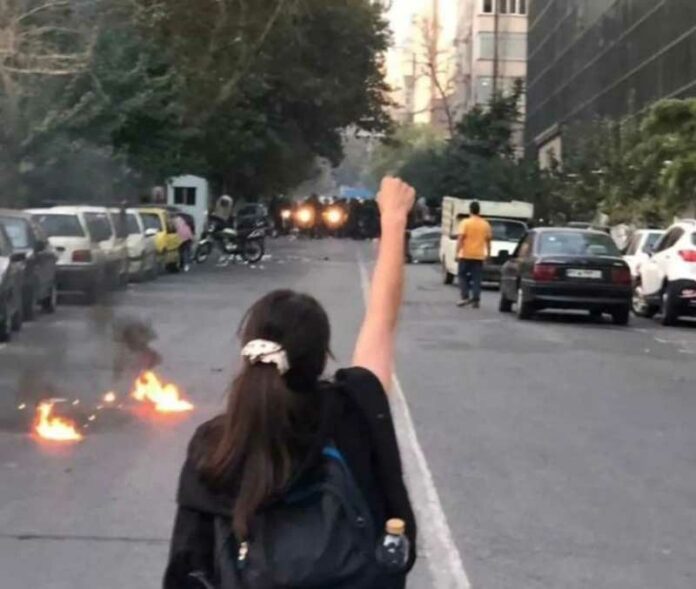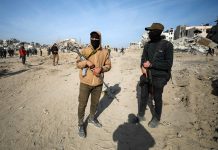The United Nations has renewed and broadened the mandate for its Fact Finding Mission on Iran (FFMI), a move described as “historic” by Baroness Helena Kennedy, the leading British lawyer, lawmaker and director of the International Bar Association’s Human Rights Institute (IBAHRI).
The FFMI was set up to investigate alleged human rights violations in the Islamic Republic of Iran related to the nationwide protests sparked by the September 2022 death of 22-year-old Mahsa Amini while in police custody.
Earlier reports by the mission found ongoing and serious human rights violations by Iranian authorities stemming from the nationwide protests, and concluded that some of those violations amounted to crimes against humanity.
Human Rights Concerns in Iran Are ‘Extensive and Complex,’ Says UN Report
“The mission reiterates its previous findings with respect to the commission of gross human rights violations and crimes against humanity in the context of the protests, including ongoing persecutory conduct against women and girls and others supporting human rights in the context of the protests,” it said. “Such conduct includes the use of the death penalty and executions, arbitrary arrests and cases of torture and ill treatment, judicial and other forms of harassment of human rights defenders and related systemic impunity.”
Kennedy told Kayhan Life that this was a “historic vote by the UN Human Rights Council (UNHRC),” passed with a majority of 24 in favor, 8 against and 15 abstentions — with half of the countries that voted in favor belonging to Africa, Latin America and Asia.
“This demonstrates the cross-regional support in addressing impunity for gross human rights violations faced by the Iranian people,” Kennedy said. “The resolution is a clear message to Iran that the international community is watching Iranian authorities and cannot tolerate impunity. It also sends a message to victims that they are not invisible, and they are not forgotten. The UN and the international community are still there for them.”
The resolution significantly widens the scope of the mission’s work and calls on the FFMI: “To thoroughly and independently monitor and investigate allegations of recent and ongoing serious human rights violations in the Islamic Republic of Iran; to establish the facts, circumstances and structural causes of such violations, including discrimination on grounds of gender, ethnicity, religion or belief and political views.”
More than 60 organizations and individuals campaigned for the FFMI to be able to continue its investigations following concerns that the UN would end the mandate after its final report was published in March.
Those organizations included IBAHRI, the Washington-based Abdorrahman Boroumand Center (ABC), We Are Iranian Students, Iran Lovers, Minority Rights Group International and Article 18, a London-based organization that promotes freedom of religion in Iran.
Nazanin Afshin-Jam, the prominent international human rights advocate and author, also campaigned for the mission’s mandate to be renewed for another year.
“I am just one among many who helped organize side events at the UN and advocated for the extension of the FFMI and the referral of its report to the security council,” Afshin-Jam said in an interview with Kayhan Life. “I have held individual meetings, supported fellow activists in hosting events and webinars to amplify our cause, and coordinated a network of over 100 Iranian diaspora groups to encourage collective action—signing letters, petitions, and standing in solidarity.”
“Beyond accountability, I hope these measures result in heightened diplomatic isolation of the regime, the implementation of targeted sanctions, and other multilateral actions that weaken the regime while empowering Iran’s peaceful, freedom-loving civil society,” she added.
Speaking to Kayhan Life, Steve Dew-Jones the news director for Article 18 said: “Freedom of religion or belief is often seen as one of the most crucial litmus tests of how a country is doing with rights. If you don’t have the freedom to believe what you believe, all other rights are likely to be at risk as well.”
“Certainly with Iran, religious belief is a driver, an indicator that many other rights are not provided for Iranians,” he added.
Iran’s regime considers Christians who have converted from Islam to be apostates, a form of religious abandonment which is a criminal offense under Iran’s law. Punishments for this offense can be severe, with judges able to impose long prison sentences, corporal punishment and the death penalty. The Islamic Republic is also the world’s most prolific executioner of children, women and men.
Iran’s Christians Are Used in Hostage Diplomacy, Face Rising Prison Sentences, Report Says
Several human rights organizations who were part of the campaign called on the UN to extend the mandate during the UNHRC session. Justice for Iran spokesperson Shadi Amin and Minority Rights Group International spokesperson Sabah Bandoui addressed the council and called for the mission’s mandate to be extended.
“We are deeply concerned by the state’s persistent campaign to silence dissent and the ongoing impunity for perpetrators, which indicates a high risk of recurrent violence,” Bandoui said. “We call on the human rights council to ensure continued investigations into serious human rights violations and atrocity crimes in Iran, investigative mechanisms must have broader mandate and temporal scope than the FFMI to monitor abuses beyond the September 2022 protests and ensure comprehensive accountability.”
The decision to renew the FFMI’s mandate in April was condemned by Iran’s government. Iran’s Foreign Ministry spokesman Esmaeil Baghaei accused states who voted for the resolution of “misusing the human rights mechanism as a means to exert political pressure on developing countries,” in an April 4 statement. Baghaei said the resolution was “legally void” due to the “ill will” of its authors, and that the document was “factually incorrect” and relied on “unsubstantiated claims by anonymous sources.”
During the session the council also renewed the mandate of the special rapporteur on the human rights situation in Iran, which is currently held by Dr. Mai Sato.
Islamic Republic’s Threats Against Lawyers Discussed at London Law Society Conference














